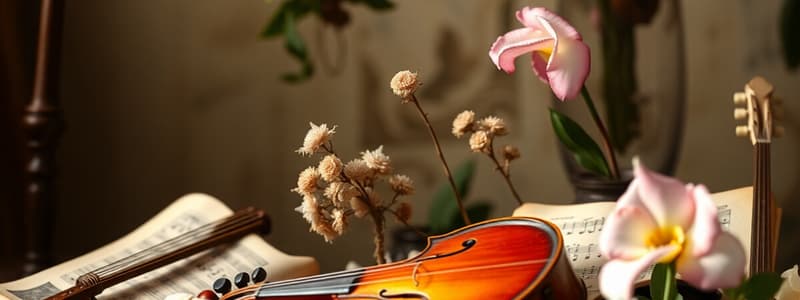Podcast
Questions and Answers
What characterizes Absolute Music?
What characterizes Absolute Music?
- It is a type of incidental music used in performances.
- It always includes vocal elements.
- It is instrumental music created solely for its own sake. (correct)
- It is music written to complement a narrative.
What is the purpose of Incidental Music?
What is the purpose of Incidental Music?
- To tell a specific story through an orchestral arrangement.
- To emphasize the rhythm without any thematic content.
- To serve as a standalone musical piece without any context.
- To provide background music that enhances the mood of a theatrical performance. (correct)
Which of the following best defines Program Music?
Which of the following best defines Program Music?
- It is music that is exclusively performed in symphonic settings.
- It is instrumental music associated with a specific narrative or theme. (correct)
- It is purely tonal music without any literary connection.
- It consists of vocal music that narrates a story.
What distinguishes a Symphonic Poem from a Program Symphony?
What distinguishes a Symphonic Poem from a Program Symphony?
What was a significant change in orchestration during the Romantic period?
What was a significant change in orchestration during the Romantic period?
Flashcards
Absolute Music
Absolute Music
Instrumental music written without any story, poem, or other program in mind, pure music for its own sake.
Incidental Music
Incidental Music
Music specifically composed for a play, used to set the mood for scenes and highlight dramatic actions.
Program Music
Program Music
Instrumental music that's intended to tell a story, poem, or scene, music with a 'program' or meaning.
Symphonic Poem
Symphonic Poem
Signup and view all the flashcards
Romantic Orchestra
Romantic Orchestra
Signup and view all the flashcards
Study Notes
Types of Instrumental Music
-
Absolute/Non-program Music: Instrumental music created for its inherent qualities, not intended to depict or narrate a story or idea.
-
Incidental Music: Music designed to accompany a stage play or movie, setting moods and emphasizing dramatic events.
-
Program Music: Instrumental music linked to a particular story, poem, or visual imagery.
Program Music Subgenres
-
Program Symphony: Multi-movement instrumental composition inspired by a literary or pictorial concept.
-
Symphonic Poem: A single-movement orchestral piece conveying a literary or pictorial idea, pioneered by Franz Liszt.
Romantic Period Orchestra
-
Larger and More Diverse Orchestra: Romantic period orchestras expanded in size and instrument variety compared to classical period orchestras.
-
Increased Instrumentation: More instruments were added to the orchestra during the Romantic era.
-
Larger Orchestra Size: By the end of the Romantic period, an orchestra might have around 100 musicians.
Studying That Suits You
Use AI to generate personalized quizzes and flashcards to suit your learning preferences.



